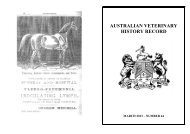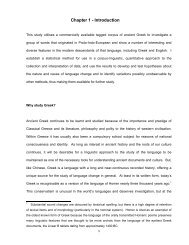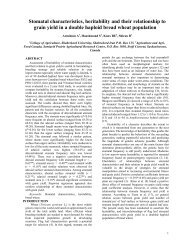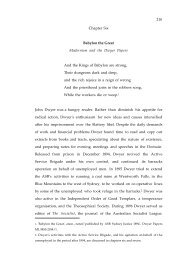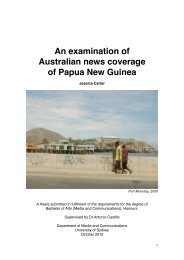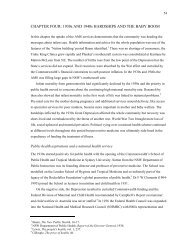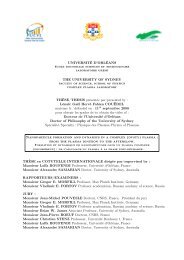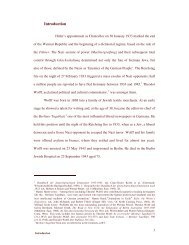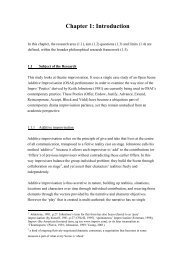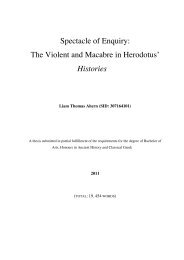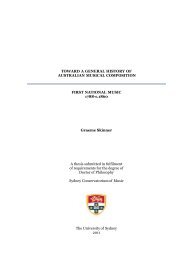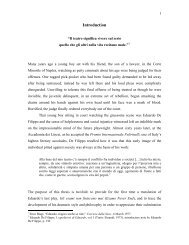journal of digital research & publishing - The Sydney eScholarship ...
journal of digital research & publishing - The Sydney eScholarship ...
journal of digital research & publishing - The Sydney eScholarship ...
Create successful ePaper yourself
Turn your PDF publications into a flip-book with our unique Google optimized e-Paper software.
1 P M J O U R N A L O F D I G I T A L R ESEARCH & P UBLISHING<br />
2010). As with all companies, Google is bound by the laws <strong>of</strong> the state in which it is<br />
operating, so while it does not actively censor through its own volition, the results it<br />
produces in each country will vary.<br />
So with a Google that is more aware <strong>of</strong> censorship issues, and more willing to be open<br />
about where and when requests for censorship occur; should we stop worrying about<br />
14%!C*1*+%!)C!I))5-%!M))N.O!P4%!1+*%!#),#%+,!4%+%!'./!3%+4"3./!,)1!A'14!#)32+'541!)+!<br />
%B%,!#%,.)+.4'3/!L*1!14%!3)A%+!)C!",!',$'B'$*"-!#)&3",2/!I))5-%!4)-$.!?&)+%!14",!0C12!<br />
percent <strong>of</strong> the web search business in the United States’ (Ferguson 2005, p. 13), it is one<br />
<strong>of</strong> the most powerful companies in the world. However it remains just that, a private<br />
company, but it is increasingly taking on public responsibilities. <strong>The</strong> library has been<br />
a public good for decades, despite what Kelly (2006) argues, the public library, at least<br />
in the western world is not really an elite form, indeed it is no more elitist than Google<br />
M))N.!'1.%-C/!A4%,!#),.'$%+%$!',!1%+&.!)C!14%!$'5'1"-!$'B'$%7!M+"B%+&",!:H=Q;>/!"+5*%.!<br />
that the public library, as an extension <strong>of</strong> the state, is responsible for the ‘public good’<br />
and insists that libraries must serve the needs <strong>of</strong> the whole community in which they<br />
are situated. Almost thirty years later, it seems the largest public library will not even<br />
be created by a state entity, rather a private company will make decisions about what<br />
books can and cannot be included in it, a company with shareholders and subject to the<br />
whims <strong>of</strong> the states in which it operates.<br />
Conclusion<br />
Where then, does all this leave us, the user? Realistically, all the discussion <strong>of</strong> censorship,<br />
copyright and the ethics <strong>of</strong> a private company making choices for the public cannot deny the<br />
power and allure <strong>of</strong> Google. ‘Google plays a peculiar and powerful role in our information<br />
culture. It is a ubiquitous brand, used as a noun and a verb everywhere from adolescent<br />
conversations to scripts for Sex and the City’ (Vaidhyanathan 2006, p. 14), Google makes<br />
our lives easier, by giving us a portal through which to view the internet, and increasingly<br />
through its other services, <strong>of</strong> which Google Books is only one. Google Books has overcome<br />
many hurdles standing in the way <strong>of</strong> its vision, altering our perception <strong>of</strong> copyright law<br />
and <strong>of</strong> the rights <strong>of</strong> the author, changing its role from content provider to content creator<br />
and changing the place <strong>of</strong> the public library in society by putting it in the hands <strong>of</strong> a private<br />
company delivering it to the world. It must be hoped that the utopian view <strong>of</strong> Google Books<br />
can be realised, but it is at the cost <strong>of</strong> authors, publishers and the traditions <strong>of</strong> property<br />
rights. Users should maintain an understanding <strong>of</strong> where their information comes from,<br />
including unpleasant concerns about censorship and text choice, while using Google Books.<br />
1 1 2



